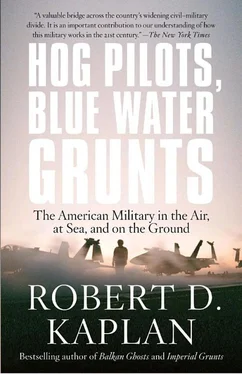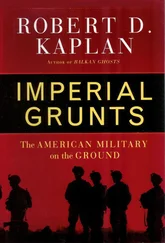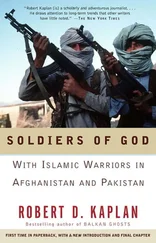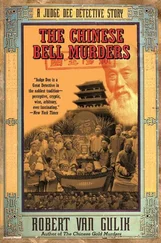When you got to know the world of these infantrymen; got to know, say, the vast differences between an Army major who was a general’s aide at a big, rear Burger King–type base and an Army major who was the executive officer (the second-in-command) for an entire battalion at an advanced operating base—a real fighting base, that is; or got to know the differences between a Marine infantry sergeant who commanded twelve men within a platoon and a gunnery sergeant who was the exalted go-to guy (the iron grunt) in a company of 150 men, then from the point of view of any civilian in an age without conscription you were inside a culture as mysterious as any encountered in the far-flung reaches of the globe.
And as I would learn, the Navy and Air Force, owing to the unfamiliar worlds of seamanship and high technology, would turn out to be more exotic still.
———
You couldn’t begin to understand the U.S. military without focusing on noncommissioned officers (NCOs, or noncoms in service lingo)—that is, sergeants and corporals—or chief petty officers in the case of the Navy. It was they who were the repository of the military’s culture and traditions, as many a West Pointer or Annapolis graduate would admit. The Prussian baron Friedrich von Steuben, during the 1777–78 winter at Valley Forge, had laid the groundwork for this NCO corps. Thus he provided the bedrock for the American military: the radical decentralization of command, so that the general directive of every officer was broken down into practical steps by sergeants and corporals and petty officers at the farthest edges of the battlefield. Officers gave orders, NCOs got things done.
NCOs were emblematic of American social history. The ever-expanding frontier of western settlement in North America was about doing, not imagining: clearing land, building shelters, obtaining food supplies. Though the family farm was dying across the continent, almost half of the sergeants in a twelve-man Army Special Forces A-team with which I embedded in Algeria had grown up on family farms. That A-team was typical of others I knew.
NCOs were also a product of America’s middle-class society. Observing third world armies, I had seen how the gulf between officers and enlisted men was like that between aristocrats and peasants. But such class distinctions did not exist in the United States to nearly the same degree. The consequence was an NCO corps that dealt confidently with its superiors, so lieutenants revered and depended upon their sergeants. This bond was at the core of a military that got the greatest possible traction out of sometimes the worst possible policies.
The importance of noncoms was magnified by the increasing size and emptying out of the battlefield. Instead of large numbers of troops fighting in a confined space—the essence of mass infantry warfare—small clusters of combatants now lay scattered across vast deserts, jungles, and slum cities. It was a world of platoons, squads, and teams: a world of NCOs, who worked at the lowest tactical level, where operational success or failure is determined. In Iraq, noncoms had a 40 percent higher mortality rate than officers. And among officers, the highest mortality rate was among lieutenants who led platoons composed of noncoms and enlisted men. 2
In an age when field troops were scrutinized under media klieg lights, the actions of individual NCOs carried untold political consequences, for better or for worse. Marine Gen. Charles C. Krulak writes, “The individual Marine will be the most conspicuous symbol of American foreign policy.” 3By “individual Marine,” read NCO. Two-thirds of all marines were noncommissioned and in their first four-year enlistment. Nearly 90 percent of Army Special Forces soldiers (Green Berets) were sergeants of one grade or another.
These NCOs had their national identities as Americans engraved in sharp bas-relief. Off duty, they were often tight-lipped, except when I asked them about the technical task at hand. Then they couldn’t stop talking. Ask them what they do, not how they feel, I had to constantly remind myself. Only after I got to know them would they tell me how they felt—how deeply they felt—and only if I didn’t ask.
———
“Men of action are the unwitting slaves of men of intellect,” observes the early-twentieth-century Portuguese poet Fernando Pessoa. 4Pessoa’s categories may be too grand and too neat, but there is a core of truth in his observation. It’s certainly true that in regard to Iraq, these soldiers and marines had to deal with the consequences of ideas about liberation, occupation, and democracy that were the product mainly of civilians in Washington with or (usually) without experience on the ground. As someone with experience living with and writing about the military, and who privately and publicly supported the invasion of Iraq from the beginning, I was not innocent in this regard. It has been said that the occupation of Iraq was so grotesquely mismanaged that the war was never given a chance to succeed. But it may also be possible that the occupation would have been cursed with even the best of plans. I backed the invasion, despite my published concerns about anarchy in the event of a flawed strategy, in the expectation that a more liberal regime of some stable sort (not necessarily democratic) would ultimately emerge in Iraq. Given current facts, it was the wrong decision. Though, by increasing the leverage of downtrodden Shiites, and thus disturbing the complacency of calcifying Sunni police states in Egypt and Saudi Arabia—as well as turning al-Qaeda against fellow Arabs—the war has created strategic opportunities still to be exploited.
To say that the U.S. military adapted well to this challenge would be an understatement. The crucible of combat, month after month, in Afghanistan and especially in Iraq, in which American troops sometimes went from urban street fighting on one day to trying to get water and electricity hooked up the next, invigorated further the character and quality of the armed services, particularly the Army, despite the damage done to it in other ways by the manpower strain that Iraq imposed. And the better the Americans fought, the better relief workers they became, as the Indian Ocean tsunami of December 2004 would demonstrate. For the logistics of humanitarian assistance were similar to the logistics of war: both demanded fast infiltration and the movement of men and equipment to a zone of activity. It was all about access. The official Marine motto might be “Semper Fidelis,” but the unofficial one was “Semper Gumby,” always flexible.
By igniting a long and bloody struggle that no one in the military wanted to repeat, the overreach in Iraq by civilians in Washington spurred men in uniform to want to increasingly manage the world through quiet alliances on one hand and the use of host-country proxies on the other. That, in turn, required greater emphasis on stealth and small units composed of extraordinary individuals, and on austere dirt outposts rather than on big legacy bases that themselves had become the cause of political friction.
The smaller the American military footprint and the less notice it drew from the outside world, the more effective would be the operation. Get in before a problem began to fester, when you had the leeway to experiment and make mistakes without suffering a loss of prestige. It was the military side of crisis prevention. The way to avoid future quagmires was to be engaged in more places, not fewer. Whereas a few hundred Special Forces troops as in Colombia and the Philippines could be effective force multipliers, and 20,000 as in Afghanistan could tread water, 150,000 as in Iraq constituted a mess.
Obviously, Iraq could have used many more troops. Once a decision was made to invade and occupy a country, well, then an overwhelming force was preferable. But small, well-chosen numbers remained a practical approach for train-and-equip and stabilization deployments almost everywhere else, in order to minimize the need for large conventional invasions in the first place.
Читать дальше












